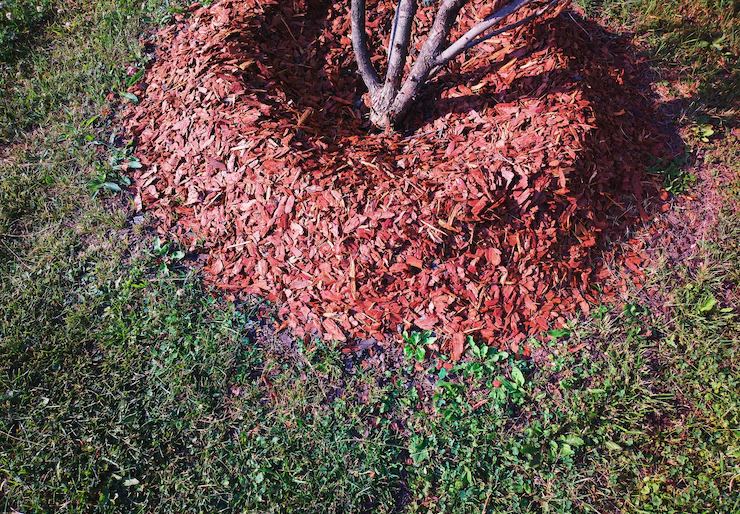Rubber mulch is an innovative and sustainable landscaping material made from recycled rubber, typically sourced from old tires. This eco-friendly product offers several advantages over traditional wood or organic mulch, making it a popular choice for landscaping, playgrounds, and sports fields. In this article, we’ll dive into the many benefits of rubber mulch, how it compares to other ground covers, and answer common questions about its use and maintenance.
What is Rubber Mulch?
Rubber mulch is a type of ground cover made from shredded or crumbed recycled rubber, usually from tires that would otherwise end up in landfills. The rubber is cleaned, processed, and dyed with non-toxic pigments to create a long-lasting, versatile mulch option. It is commonly used for landscaping, playground safety surfaces, and even in sports fields due to its durability, cushioning, and low-maintenance nature.
Benefits of Rubber Mulch
1. Durability
Unlike organic mulch that decomposes over time, rubber mulch can last for years without needing replacement. Its composition prevents it from breaking down due to weather exposure, making it a long-lasting investment.
2. Eco-Friendly
By recycling old tires, rubber mulch helps reduce waste in landfills and contributes to environmental conservation. Using rubber mulch also eliminates the need for tree-cutting for traditional wood mulch.
3. Cost-Effective
Though the initial cost may be higher than wood or organic mulch, rubber mulch’s durability and longevity make it a cost-effective choice in the long term. It can last up to 10 years or more without needing replacement, saving you the recurring expense of replenishing organic mulch.
4. Moisture Retention
Rubber mulch helps retain soil moisture by preventing evaporation. While it doesn’t absorb water like organic mulch, it creates a barrier that reduces the need for frequent watering, especially in drier climates.
5. Prevents Weed Growth
A thick layer of rubber mulch creates a barrier that discourages weed growth. This reduces the need for chemical weed killers and constant weeding, making your garden or landscape easier to maintain.
6. Safety and Shock Absorption
Rubber mulch is an excellent choice for playgrounds and areas where safety is a concern. Its cushioning properties help absorb impacts, reducing the risk of injury from falls. This makes it ideal for use under swings, slides, and other playground equipment.
7. Pest and Fungus Resistance
Unlike wood-based mulch, rubber mulch does not attract insects, termites, or fungal growth. Its non-organic nature makes it less susceptible to rot, mold, or pests, providing a cleaner, healthier environment.
8. Color Variety and Longevity
Rubber mulch is available in a wide range of colors, including natural browns, reds, and even bright blues or greens. The color doesn’t fade as quickly as organic mulch, maintaining its vibrant appearance for years.
Applications of Rubber Mulch
Rubber mulch is versatile and can be used in various settings, such as:
- Landscaping: Ideal for flower beds, shrubbery, and around trees, rubber mulch enhances the aesthetic appeal of gardens and yards.
- Playgrounds: Its shock-absorbing properties make it a top choice for playgrounds to reduce the risk of injuries from falls.
- Sports Fields: Rubber mulch provides excellent drainage and shock absorption, making it suitable for tracks, outdoor gyms, and athletic fields.
- Dog Parks: It’s also used in pet-friendly areas due to its durability and resistance to wear from high foot traffic.
How Does Rubber Mulch Compare to Wood Mulch?
| Feature | Rubber Mulch | Wood Mulch |
|---|---|---|
| Durability | Lasts 10+ years | Decomposes within 1-2 years |
| Cost | Higher initial cost, long-term savings | Lower initial cost, higher maintenance cost |
| Water Retention | Helps retain moisture, but doesn’t absorb | Absorbs water and helps retain moisture |
| Weed Control | Excellent weed barrier | Requires thicker layers for weed control |
| Safety | Great for shock absorption | Less effective at impact cushioning |
| Pest Resistance | Doesn’t attract insects or termites | Can attract pests and termites |
| Eco-Friendliness | Recycled product, reduces landfill waste | Biodegradable but may require more tree cutting |
How to Install Rubber Mulch
- Prepare the Area: Remove any existing mulch, weeds, or debris from the area.
- Lay a Weed Barrier: To enhance weed control, it’s recommended to lay a landscaping fabric before applying rubber mulch.
- Apply the RubberMulch: Spread the rubbermulch evenly across the area, ensuring a layer of about 1.5–3 inches thick for optimal performance.
- Maintain the Area: While rubbermulch requires minimal maintenance, you may want to occasionally rake it to redistribute the material and keep the surface even.
Pros and Cons of Rubber Mulch
Pros of Rubber Mulch
- Durability
- Rubber mulch can last up to 10 years or more without decomposing, making it highly durable compared to organic mulch.
- Low Maintenance
- It doesn’t need to be replaced annually, reducing maintenance efforts and costs over time.
- Eco-Friendly
- Made from recycled tires, it helps reduce landfill waste and supports environmental sustainability.
- Weed Control
- Acts as an effective barrier to weed growth, reducing the need for herbicides or regular weeding.
- Pest Resistance
- Unlike wood mulch, rubbermulch doesn’t attract pests like termites, ants, or rodents.
- Safety and Shock Absorption
- Provides excellent cushioning, making it ideal for playgrounds and reducing injury risks from falls.
- Weather Resistance
- Rubber mulch withstands extreme weather conditions without breaking down or being washed away by rain.
- Color Longevity
- Available in various colors, it holds its color longer than organic mulches, enhancing landscape aesthetics for years.
- Moisture Retention
- Helps retain soil moisture by creating a barrier, though it doesn’t absorb water like organic mulch.
Cons of Rubber Mulch
- Higher Initial Cost
- Rubbermulch can be more expensive upfront than traditional wood or organic mulch.
- Limited Nutrient Addition
- Unlike organic mulches, rubbermulch doesn’t decompose and thus doesn’t contribute nutrients to the soil.
- Potential Toxicity
- Though considered safe, some concerns exist regarding the potential release of chemicals, especially when heated by sunlight.
- Fire Risk
- While more fire-resistant than wood mulch, rubbermulch can still ignite under high heat or open flames.
- Odor
- When first installed, rubbermulch may have a slight rubbery smell, especially on hot days, though this usually dissipates over time.
- Not Biodegradable
- Rubbermulch doesn’t break down naturally, meaning it will need to be manually removed if no longer desired.
- Surface Heat
- Rubbermulch can absorb and retain heat, making it potentially too hot to touch in areas with direct sun exposure. This can be uncomfortable for playgrounds in hot climates.
- Potential for Compaction
- Over time, especially in high-traffic areas, rubbermulch may compact and require raking to maintain a soft, even surface.
Conclusion
Rubber mulch offers a versatile, eco-friendly, and durable ground cover solution for a wide range of applications. Its longevity, pest resistance, and safety features make it a superior alternative to traditional wood mulch, particularly for playgrounds and high-traffic areas. Though it may come with a higher upfront cost, the long-term savings and minimal maintenance requirements make rubbermulch an excellent investment for landscaping projects.
By choosing rubbermulch, you’re not only improving your outdoor space but also contributing to environmental sustainability.
FAQs About RubberMulch
1. Is RubberMulch Safe for Children and Pets?
Yes, rubbermulch is considered safe for both children and pets. It is non-toxic, does not contain harmful chemicals, and its shock-absorbing properties reduce the risk of injury in playgrounds. However, ensure that the rubbermulch you purchase meet safety standards.
2. Does RubberMulch Smell Like Tires?
When first installed, rubbermulchs may have a slight rubbery smell, especially on hot days. However, this typically fades within a few days to weeks, leaving no noticeable odor.
3. Does RubberMulch Attract Pests?
No, rubbers mulch does not attract pests such as termites, ants, or rodents, making it a pest-resistant option for landscaping.
4. Is RubberMulch Flammable?
While rubbermulchs is more fire-resistant than wood mulch, it can still burn if exposed to high heat or open flames. It is recommended to keep it away from fire sources such as grills or outdoor fire pits.
5. Does RubberMulch Need to Be Replenish?
Rubbermulchs lasts much longer than organic mulch and doesn’t break down over time. It may need to be redistribute or topped up slightly after several years, but it doesn’t require yearly replenishment.











